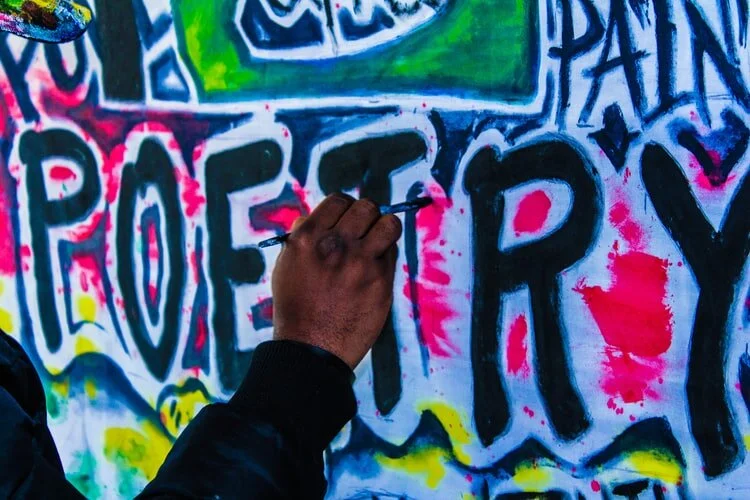ACCEPTING BOOK REVIEW SUBMISSIONS! Learn more about River Street’s new book review series. New reviews published bi-monthly—and we PAY for them! Get the deets in this blog post.
Let's Talk Writing and Anxiety
Right before I wrote my first university exam, I felt extremely shaky and weak. I stood next to some classmates discussing some of the study terms when I realized how unbearably hot the basement was. I tore off my coat, but it wasn’t enough. I kept sweating and my throat kept restricting. Feeling like I was about to throw up, have diarrhea, faint, or all three, I went to the bathroom. I crouched in the bathroom stall, not knowing whether to put my head over the toilet and hold back my hair, pull down my pants and sit, or shut the lid so I didn’t drown when I fainted. Tears welled up in my eyes as I thought, I’m going to die.
A Year in Review: Long-Term COVID-Burnout and Writing
Know Your Worth: The Secret to Perseverance in Writing
So, How Do You Qualify Good Writing?
Good writing is extremely hard to define as there’s a level of subjectivity to it. It’s easy to know what good math is, because you either get the right answer or you get a wrong one. But writing is different. I could read a book and think it’s the best thing I’ve ever read, and you could read the exact same book and think it’s the worst thing you’ve ever read. So, was the book good or bad?
How to Develop a Writing Routine
Seeing as we’re pretty late into the fall season now, chances are you’re pretty well-adjusted to a routine. It’s likely one slightly different than you’re used to, but it’s a routine, nonetheless. Much like how school, jobs, and chores sink into monotony, your process of writing does too. There are lots of different ways to write a text and writers usually find themselves sticking to a specific method.
Learning to Appreciate Poetry
What I’m about to say is going to sound strange coming from a creative writer, but it’s the truth: I’ve never really liked poetry. I’ve always preferred a straightforward narrative to an abstract piece. In elementary and high school, the meter and rhyme of poetry confused me, and I could never grasp the themes as quickly as I could in a novel or short story. In university, I wrote a few poems when I had to, but I always dreaded them.
Conversations on Creativity: Where Stories Come From
4 Common Creative Writing Mistakes (And How to Avoid Them)
Writing is a skillset. And like all skillsets, writing takes time to perfect. You’re going to make mistakes, especially at first. But when you understand those missteps and adapt your craft accordingly, you will become a stronger writer. I thought it would be helpful to highlight common writing mistakes to save you some time in the learning process. Here they are:
The Idiot Box or...Not? The Benefits of TV for Writers
Phrases like “stop watching that TV, it’ll turn your brain to mush” are extremely common, especially amongst parents. And parents do have a point, you need to exercise your brain with complicated tasks that help you improve your overall intelligence. But the more interested in writing I got, the more engaging I found TV to be.
3 Tips to Help You Be A Better Editor
Why Read? Why Write? Why Bother At All?
In these blogs, I’ve talked a lot about how to become a better writer, and even touched on why writers are important, but today I want to talk about the direct effect writing has on readers and writers alike. This article won’t touch on everything that writing does, as a lot of it is unique to personal experiences and to each piece. However, there are a few broad consequences that are applicable to most texts.
Stuck in a Writing Rut? Here's What to Do!
Too Much of a Good Thing: Balancing Self-Criticism in Creative Writing
Between the personalized pieces and the competitive publishing industry, the world of writing is emotionally draining by nature. It is so easy to get dispirited. While the ability to self-criticize helps you improve your craft, too much of it will harm your career as well as your mental health. That’s why it’s important to persevere despite all of your insecurities.
A Writer's Purpose
Often times when I tell people that I am studying creative writing they reply with the ever awkward: “oh…” sometimes followed by a polite: “good for you!” I don’t think the reason that many people react this way to my degree is because they think that writers are stupid, I think that they just don’t understand what a writer’s purpose is. It may not be as well-known as an engineering or a nursing degree, but a writing degree (and all arts degrees for that matter) has a purpose, nonetheless.
Epic Momentum: A Review of Crito Di Volta by Marc Di Saverio
Should You Really Only Write What You Know?
How Do Writers Find Ideas?
Editing 101: Tips on Editing Your Own Work
Time on Your Hands and No Motivation to Write? Read This!
Right now, many of us are finding ourselves with a lot more free time than usual. Now you might be like my mother who has no issues with staying at home and getting work done. But if you are like me, and have difficulty motivating yourself to be productive when on your own, then this article is for you.





















